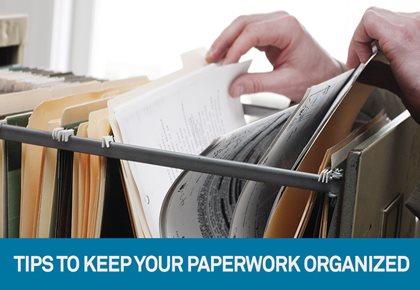Managing Your Association’s Paperwork: 6 Tips to Make it Easier
 Is organizing paperwork on your list of favorite things to do? No? You’re not alone! Although it’s not something that most people enjoy, maintaining good records is critical to the most important functions of your community association. Consistently following a good organizational system will streamline your operations and increase efficiency, preserve the history of your activities and provide transparency.
Is organizing paperwork on your list of favorite things to do? No? You’re not alone! Although it’s not something that most people enjoy, maintaining good records is critical to the most important functions of your community association. Consistently following a good organizational system will streamline your operations and increase efficiency, preserve the history of your activities and provide transparency. We’ve collected a few ideas to help make this sometimes burdensome task a little easier. Follow our tips and paperwork won’t be the chore it once was. Your association will thank you for it.
1. Designate one person to keep your records.
Record keeping is very important and should be assigned to a specific person. Leaving it as anybody’s job usually means it ends up being nobody’s job, so make sure you delegate this critical task to one individual. Consider asking your community association manager or assistant manager to take on the role. If your community is self-managed, this task normally falls to the Board secretary, though any member can be assigned this important duty.
2. Become informed about legal requirements.
Unfortunately, most state laws don’t provide much guidance. In many states, it’s limited to broad statements requiring that records be kept “in accordance with generally accepted accounting principles.” Still, it’s wise to check with your auditor or the statutes in your state as they can vary greatly. The right property management partner will be well versed in the law and can help you with this aspect of your record keeping. And always consult with your association attorney.
3. Take advantage of digital storage.
Gone are the days of towering stacks of paperwork and overflowing filing cabinets. Electronic record keeping is here to save the day! An excellent community association management company can implement a system that allows you to scan and digitally file important documents. In an age of ongoing digital security threats, they can also help ensure that your community has the correct firewalls and security measures in place too. This provides a safe, secure storing house for your records that is also easily accessible and searchable.
4. Prioritize your paperwork by importance.
This step is the most challenging, simply because almost all of the documents your community association will generate are essential, including bids and reports. Crucial pieces of information – such as the Declaration of Condominium or Covenants and Restrictions, Articles of Incorporation, Bylaws and Rules and Regulations – should be kept in an accessible place. In addition, your meeting minutes, communications with homeowners, financial documents such as billing statements, vendor contracts, insurance policies, warranties and maintenance records should be placed into easily identifiable files so that they are readily available when needed.
It is important to keep in mind that these documents may go through multiple revisions before arriving at the final document. Typically, once a document is amended, the previous version is no longer valid. While it is okay to save these versions for your association’s reference, you want to ensure that the “final” version of the document is saved as the “official record.”
5. Keep those important documents easily accessible.
Certain documents, such as your Board meeting minutes and governing documents, should always be accessible to homeowners and Board members. Those documents can provide answers to questions, settle disputes and offer guidance when the Board is considering modifications to the community. They need to be kept accessible in a central office or through an internal digital communications system. Your property management company can help you implement a system that ensures fair access for everyone.
6. Maintain both transparency and confidentiality.
Homeowners have the right to see approved contracts, meeting minutes from open Board meetings, financial statements, governing documents and more. In the interest of transparency, these documents need to be accessible to homeowners. But there are some areas in which the Board’s interest in confidentiality overrides transparency. Employment matters, litigation strategies, certain delinquency matters and contract negotiations are a few examples. They may be protected by law as being confidential, or even required to be kept confidential. If you have any questions about how to classify a document, consult your association attorney.
It is possible to communicate necessary information to homeowners without violating confidentiality. Summarize important events in community e-newsletters, or hold informational gatherings to answer questions from homeowners and residents. It’s a good idea, whenever you know that sensitive topics are going to be discussed, to invite both your association attorney and your community association manager to these gatherings.
With the right organizational system in place in your association, your collection of paperwork will be neat and serviceable, an asset to your Board. For more information on how partnering with a professional property management company can help your association run smoothly, contact FirstService Residential, North America’s leading community association management company, today.
For further information on how a great property management company can help your community, fill out the form below.
For further information on how a great property management company can help your community, fill out the form below.